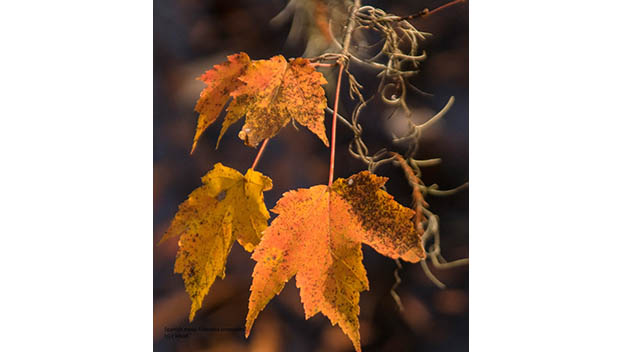Mother Nature’s Garden: The importance of trees
Published 11:42 am Monday, January 1, 2024

- Fall at First Landing State Park: Maple leaves adorned with Spanish moss. (Photo by Dr. Cynthia Wood)
|
Getting your Trinity Audio player ready...
|
When we moved into our current home 35 years ago, our street was lined with dogwoods, and nearly every house was surrounded by trees. Since then, all but two of the dogwoods have died, and new homeowners have removed many of the trees. They say that they’re afraid that the trees might fall on their homes, a fear that many older homeowners seem to share.
We’ve lost two large white oaks. One uprooted itself several years ago after a week of heavy rain. The other we reluctantly removed this year because it was leaning precariously and showing signs of disease.
It’s all rather sad because trees not only enhance the beauty of a neighborhood, but also provide many other benefits, including the reduction of heating and cooling costs. When planted on the northern and western sides of a house, deciduous trees will buffer it from direct sun during summer months and can lower air conditioning costs by as much as 35 percent. In winter, when these trees have lost their leaves, sunlight can reach the home, thus providing some passive solar heat.
Trees can help muffle unwanted noise from busy highways, a problem that’s been around for centuries. Ancient Rome had so much street noise that Julius Caesar banned chariot traffic at night, and the satirist Juvenal commented that citizens were dying because of the noise. Not all trees, however, are equally effective at buffering noise. The most effective ones have dense, evergreen foliage and rough bark. These trees are also more effective when planted in clusters and combined with shrubs and fences or other barriers. Estimates of the ability of trees to reduce noise levels are highly variable because so many factors are involved.
Trees can also help reduce air pollution by absorbing carbon dioxide and other pollutants, such as carbon monoxide, sulfur dioxide, and nitrogen dioxide. According to the US Department of Agriculture, an acre of trees can absorb six tons of carbon dioxide and produce four tons of oxygen, enough for 18 people for a year. It’s no wonder, then, that tropical rainforests are often referred to as the lungs of the planet. Tropical rainforests cover about 7 percent of earth’s dry surface, but generate about 20 percent of the world’s oxygen.
Trees even impact water management and quality. They anchor the soil, thus impeding erosion and lessening runoff of storm water. Studies show that a street lined with trees produces over 300 gallons less runoff in a year than one without trees.
And finally, the presence of trees helps reduce stress and improve our moods. They bring elements of nature into urban settings, while providing food and shelter for wild animals. We humans also benefit from the shelter of spreading tree branches. There was a reason why country churches used to host homecoming lunches under the welcoming embrace of ancient shade trees.
Dr. Cynthia Wood is a master gardener who writes two columns for The Herald. Her email address is cynthia.crewe23930@gmail.com.





